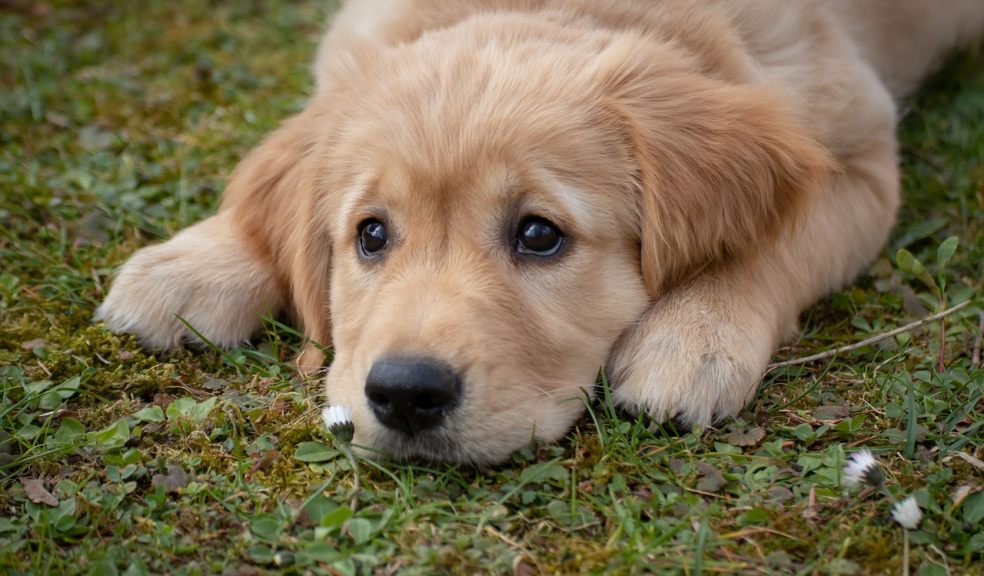
Absolute Dogs: How to Overcome Four of the Most Common Puppy Struggles
It doesn’t get much more exciting than bringing a puppy into your world. After all, you’re signing up for years of fun and companionship. But that’s not to say you won’t stumble across the odd puppy struggle that feels difficult to overcome.
While there’s lots of conversation out there about the joy of getting a puppy, fewer people are talking about puppy struggles. Why? Because these struggles quickly become a thing of the past once you master them.
At this point, you’re left with the well-behaved best friend that you always dreamed of. This is why so many adult dog owners are quick to encourage others to get a puppy. The memories of their more difficult training times have faded.
Soon, this can be you too. To help you along, Lauren Langman and the training pros at Absolute Dogs have listed four of the most common puppy struggles and shared tips to help you overcome these. These tips follow Absolute Dogs’ games-based training approach, which upholds fun at all times.
Struggle 1. Getting Distracted by Other Dogs and Other People
When you first bring your puppy home, they’ll probably follow you everywhere. At this stage, most puppies feel deeply attached to their owners and won’t be easily distracted by other people or dogs.
Fast forward a few weeks, and your puppy may start to show more interest in the wider world. Other people, dogs, squirrels, trees, and pretty much anything become interesting — a distraction that they may choose over you.
The good news is, it’s natural for your puppy to want to learn about the world. As they approach adolescence, they’ll likely become more curious. However, if your puppy becomes so distracted that they don’t respond to your cues, try these training tips from Absolute Dogs.
Practise Non-Event Training
Reward your puppy every time they don’t respond to a potential distraction, or “non-event.” The aim is to help your puppy focus on you over all else. Non-events might include bikes, cars, leaves, people, or other animals. Non-events don’t have to be physical, though. For example, the sound of a plane flying overhead or tyres on gravel can also distract puppies.
Try Hand Feeding
Hand feeding can help your puppy keep their attention on you instead of distractions “Ditch the Bowl” and spread your puppy’s food allowance throughout the day, feeding them a reward every time they behave as you’d like them to. Hand feeding is a great way to strengthen your relationship with your puppy, much more so than setting down a bowl of food at mealtimes.
Gradually Increase the Level of Distraction
The outside world is probably full of far more distractions than your home. As a result, taking your puppy into public spaces too quickly can prove overwhelming for them. Instead, start by playing games in your home and garden. Play these games in every room to get your puppy used to different environments.
From here, gradually introduce your puppy to the outside world. Start with public places that are likely to have minimal distractions, and play games that your puppy already knows. This way, you only introduce one layer of change at a time. As you explore, take note of which environments are low-, medium- or high-distraction and whether this category shifts on certain days of the week or at certain times of day.
Struggle 2. Difficulties With Crate Training
Crates (or exercise pens) give your puppy a safe place to rest and relax. Training them to use a crate also familiarises them with confinement. This can prove useful when you take them to the vet, groomer, or boarding kennel.
However, training your puppy to use a crate isn’t always easy. Whether you’re using a crate or an alternative puppy-proofed space, these tips from Absolute Dogs can make crate training easier.
Make Your Crate Appealing and Take Toilet-Training Measures
Your puppy’s crate should be big enough for them to stand up, turn around, and lie down. Some puppies find plastic, airline-type crates more appealing, and others prefer wire crates.
Whichever type you choose, try these steps to encourage your puppy to use their crate:
- Play Absolute Dogs’ boundary games, but replace the boundary with your crate.
- Leave the crate open and reward your puppy every time they interact with it. Interactions might include sniffing the crate or going inside.
- Add a plush blanket to make the crate especially appealing. However, blankets can affect toilet training if your puppy urinates and can’t feel the dampness because of the material. In this case, opt for a bed that absorbs pee accidents or try a thinner blanket/towel.
Build Your Puppy’s Confidence
When you first bring your puppy home, keep their crate near you. If the crate is next to your bed, for example, you can dangle a hand or toy into the crate to offer comfort. You could also set up different crates throughout your home to keep your puppy away from the chaos of home life when it occurs.
As your puppy grows, slowly increase the distance between you and their crate(s). This gradual distancing can help prevent your puppy from developing separation-related anxiety.
Struggle 3. Recall Challenges
One of the first training areas that many puppy owners work on is recall (training your puppy to come right away when called). Recall training often becomes more difficult when your puppy turns 12-16 weeks old, at which point they often show more interest in the world around them.
Much like in Struggle 1, it can be difficult to disengage your puppy from their environment and get them to respond to your cues. Here are four tips from Absolute Dogs to help.
Develop Proximity With Your Puppy
Proximity is crucial to growing a strong recall. You can develop proximity with your puppy by reinforcing their choice every time they choose to hang out with you. The more they value being close to you, the better their recall is likely to be. If they value being near you, they’re also less likely to wander off in the first place.
Make sure you balance this proximity training with crate training to avoid separation-related behaviour problems.
Play Disengagement Games That Encourage Recall
Disengagement is a key concept when it comes to puppy training. Sometimes, your puppy needs to disengage from you so they can develop their independence. More often, they need to disengage from distractions so they can come back to you.
Disengagement training involves preparing your puppy to handle distractions rather than working through these distractions when they occur. This preparation allows you to compete against whatever distractions the world throws at your puppy.
Absolute Dogs recommends playing games with your puppy that focus on disengagement. These games encourage your puppy to choose you over a squirrel (or other distraction) without hesitation. Games like this avoid putting your puppy in a situation where they need to disengage before they understand this concept.
You can learn several disengagement games in Absolute Dogs’ Engage Disengage course.
Create A Sense of Optimism
Some puppies are naturally pessimistic and believe the world is worrisome and unpredictable. These puppies may struggle with recall in situations where they lack confidence.
You can help your puppy build confidence by showing optimism in scenarios where distractions might arise. This approach can help your puppy perceive these scenarios as novel situations that they can handle. When you create the sense that “everything is fine,” your puppy can interpret this as not needing to engage, whether out of fear or excitement.
Plan An Emergency Recall
In the event that nothing works when you call your puppy, having an emergency recall can help. Absolute Dogs’ Whistle Recall mini-course shows you how to set up an emergency recall for situations that you’re not prepared for.
Struggle 4. Separation-Related Behaviour and Anxiety
It’s not uncommon for puppies to react to separation, especially as they’ve already left their mother and siblings. Depending on the circumstances, they may have also left an environment that they had grown used to.
If your puppy has a hard time being left alone, a carefully mapped-out training plan can help them overcome this emotional state. The sooner you implement this plan, the quicker you can curb separation-related behaviours and emotions.
Whether these behaviours and emotions are mild, moderate, or severe, there are ways to get on top of them. Here are three tips from Absolute Dogs to help your puppy overcome separation-related challenges.
Reward Calmness
Practising and rewarding calmness is key to minimising separation anxiety. When you reward your puppy for being calm, you can encourage this behaviour at all times, even when you’re not by their side.
Give your puppy a low-value reward every time they exhibit calmness, keeping your voice and body calm too. Your puppy might show calmness by resting their head on the floor, sighing, or laying on a blanket/their bed.
Absolute Dogs’ Calm course can give you a head start on fostering calmness for your puppy.
Play Disengagement Games That Distance You From Your Puppy
We’ve already covered disengagement training to help your puppy focus on you. But if your puppy is struggling with separation anxiety, disengagement training that helps them take their focus off you can work wonders.
Weave calmness through boundary games that slowly increase the distance between you and your puppy. As they become more comfortable with the distance between you, increase this distance.
Bonus tip: Giving your puppy a chew or food enrichment toy can be helpful when showing your puppy that it’s okay for them to be in a separate space from you.
Cultivate Independence
Helping your puppy become more independent can help them realise that they are safe when alone. By encouraging them to play and explore independently, you can help them develop this confidence.
Absolute Dogs recommends a Novelty Surprise Party game to help your puppy grow their independence. You can set up this game by choosing various household items that are safe for your puppy to interact with. Arrange these objects in a small space, and sprinkle your puppy’s daily rations amongst them.
Step back and watch as your puppy explores the items. The food will reinforce them for being brave, and they will learn that they don’t always need your intervention or encouragement. Take note of any items that cause your puppy to hesitate so you can adapt the game to meet specific goals next time.
Get More Advice From Absolute Dogs
These are just four of the puppy struggles that you might come across. Absolute Dogs shows you how to overcome many more training challenges in its puppy resource bundle.
About Absolute Dogs
Absolute Dogs provides a motivational, fun-filled suite of training tools that guide dog owners through challenges of all kinds. Owners no longer feel alone when they join Absolute Dogs’ community of like-minded owners who are, or have been, in the same position.
Dog owners find all the support they need in Absolute Dogs’ wealth of training courses, Games Club, Pro Dog Trainer Club, Sexier Than a Squirrel Challenge, free videos, blog, and podcast.













